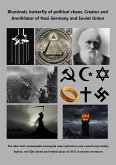
22,49 €
inkl. MwSt. und vom Verlag festgesetzt.
Sofort per Download lieferbar
eBook, ePUB
19. August 2022
Michael Cassella-Blackburn

27,99 €
Versandfertig in 1-2 Wochen
Broschiertes Buch
Conspiracy and Political Fear in Mid-20th Century America
19. August 2022
Michael Cassella-Blackburn
Ähnliche Artikel


1,99 €
Sofort per Download lieferbar
eBook, ePUB
20. Mai 2022
Lulu.com

2,99 €
inkl. MwSt. und vom Verlag festgesetzt.
Sofort per Download lieferbar

2,99 €
inkl. MwSt. und vom Verlag festgesetzt.
Sofort per Download lieferbar

2,99 €
inkl. MwSt. und vom Verlag festgesetzt.
Sofort per Download lieferbar

2,99 €
Sofort per Download lieferbar

9,49 €
inkl. MwSt. und vom Verlag festgesetzt.
Sofort per Download lieferbar
eBook, ePUB
28. August 2024
Kid Montoya

2,99 €
inkl. MwSt. und vom Verlag festgesetzt.
Sofort per Download lieferbar

0,00 €
inkl. MwSt. und vom Verlag festgesetzt.
Sofort per Download lieferbar
eBook, ePUB
14. Mai 2018
William Myron Price

2,99 €
inkl. MwSt. und vom Verlag festgesetzt.
Sofort per Download lieferbar
Ähnlichkeitssuche: Fact®Finder von OMIKRON
